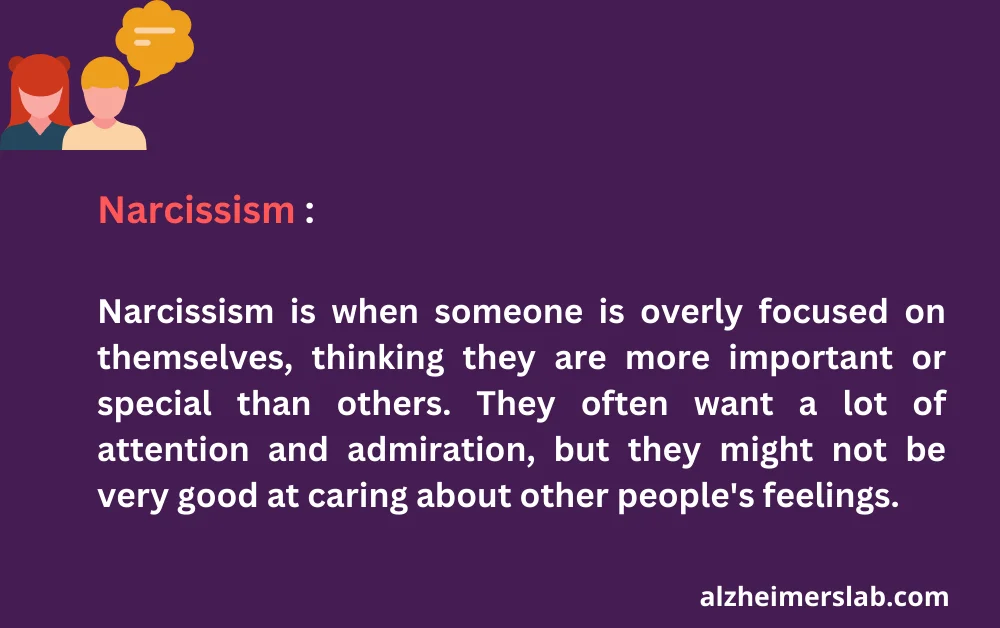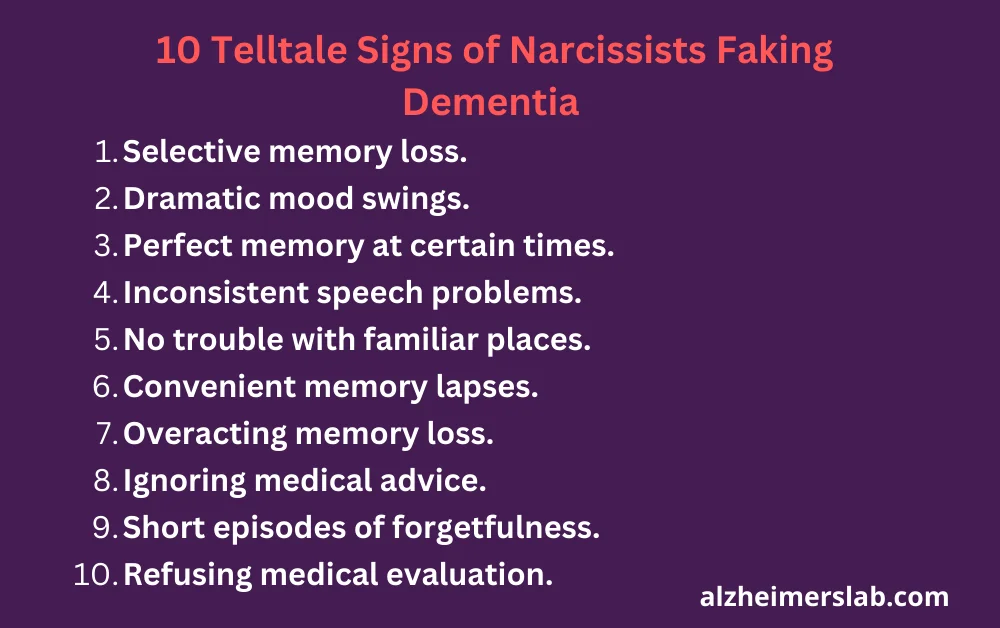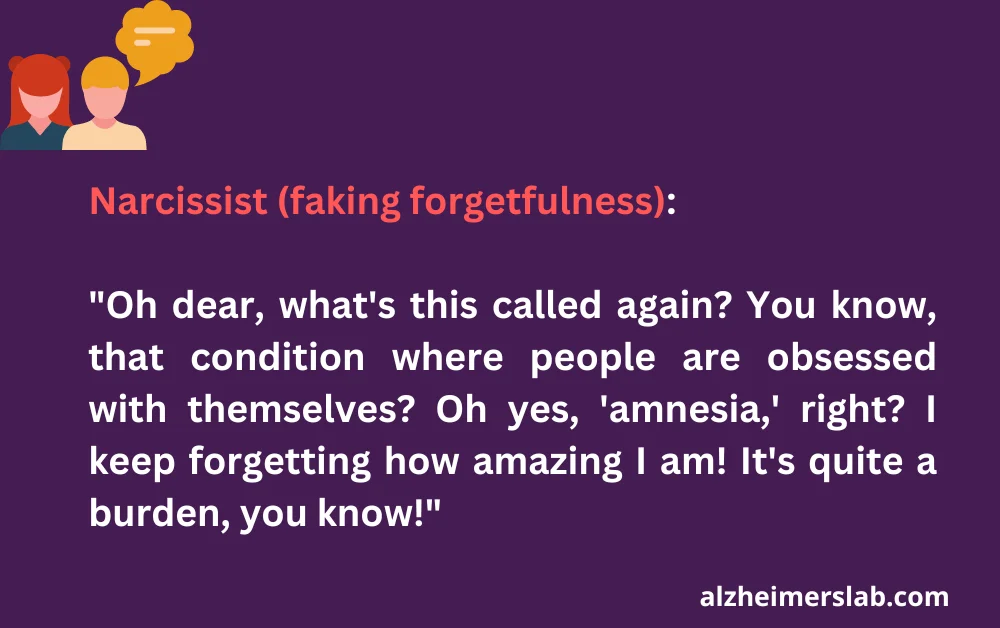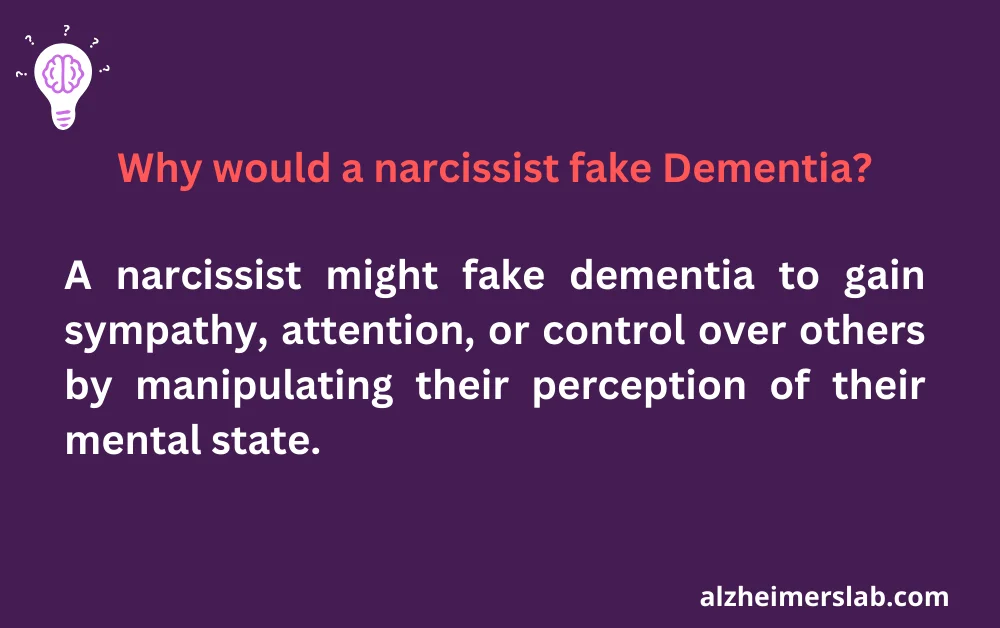Can a Narcissist Fake Dementia?
Imagine waking up one day and realizing that your memory is slipping away, your loved ones become strangers, and you’re struggling to recognize your own reflection in the mirror. Dementia is a heartbreaking condition that affects millions of people across the United States.
But what if I told you that some individuals could fake dementia, not because of a medical condition, but due to something much darker? In this article, we’ll delve into the unsettling world of narcissists faking dementia, revealing their motives, tactics, and the devastating impact it can have on families.
Understanding Dementia
Before we dive into the disturbing phenomenon of narcissists faking dementia, let’s grasp a basic understanding of dementia itself.
What is Dementia?
Dementia is a broad term used to describe a decline in cognitive function that affects a person’s daily life. It’s not a single disease but rather a group of symptoms caused by various brain disorders. Alzheimer’s disease is the most common form of dementia, accounting for about 60-80% of cases.
The Impact of Dementia
Dementia can be emotionally and financially draining for both the affected individual and their family. It leads to memory loss, impaired judgment, confusion, and personality changes. Coping with dementia requires patience, empathy, and understanding from caregivers.
What is Narcissism?

Now that we have a grasp of what dementia is, let’s delve into the world of narcissism and how it relates to faking dementia.
Understanding Narcissism
Narcissism is a personality disorder characterized by an inflated sense of self-importance, a constant need for admiration, and a lack of empathy for others. Narcissists often believe they are superior to everyone else and will go to great lengths to maintain this illusion.
The Narcissist’s Rationale
Narcissists crave attention and admiration above all else. They will do whatever it takes to ensure the spotlight remains on them. Faking dementia can serve their need for attention in a twisted way, as it garners sympathy, concern, and support from those around them.
The Telltale Signs of Narcissists Faking Dementia

Now, let’s explore how narcissists go about faking dementia and what signs to look out for.
The Acting Skills
Narcissists are often skilled actors. They may pretend to forget names, events, or even simple daily routines. Their acting can be so convincing that even close family members may doubt their suspicions.
Selective Memory Loss
Unlike genuine dementia, narcissists’ memory loss tends to be selective. They may conveniently forget things that serve their purpose while retaining information that benefits them. This inconsistency is a red flag.
The Manipulative Behaviors
Narcissists are masters of manipulation. They may use their fake dementia as a tool to guilt-trip or control those around them. For instance, they might accuse family members of neglect or become overly dependent, forcing loved ones to cater to their every need.
Useful Scenarios

To better illustrate this disturbing behavior, let’s look at a couple of real-life examples of narcissists faking dementia.
Example 1: Sarah’s Story
Sarah’s family noticed her memory lapses, and they became increasingly concerned for her well-being. However, they also observed that she never forgot to ask for money or favors. It became evident that her “dementia” was a ploy to exploit their sympathy.
Example 2: Mark’s Manipulation
Mark, a narcissist, began feigning memory loss when his wife threatened to leave him due to his abusive behavior. His “memory lapses” conveniently occurred during arguments, making his wife feel guilty for her grievances.
The Consequences
Faking dementia has profound consequences, not only for the narcissist but for their loved ones as well.
Emotional Toll on Family
Family members who genuinely care for the narcissist are put through emotional turmoil. They may doubt their own perceptions, experience frustration, and endure the stress of caregiving.
Financial Impact
Narcissists faking dementia can drain the family’s financial resources through unnecessary medical tests, treatments, and legal proceedings. The financial burden can be overwhelming.
Delay in Genuine Diagnosis
The deception can also lead to a delay in diagnosing and addressing real medical conditions. This delay can be life-threatening, especially for older individuals who are more susceptible to various health issues.
Unmasking the Deception
So, how can we unmask a narcissist faking dementia and protect ourselves and our loved ones from this manipulation?
Seek Professional Evaluation
If you suspect someone is faking dementia, consult a medical professional. They can conduct thorough assessments to differentiate between genuine dementia and deceptive behavior.
Document the Behavior
Keep a record of the individual’s behavior and inconsistencies. This documentation can be valuable when discussing your concerns with healthcare providers and other family members.
Maintain Boundaries
Narcissists thrive on manipulating those around them. Establishing and maintaining boundaries is crucial to protect yourself emotionally and financially.
Why would a narcissist fake Dementia?

You might be wondering why someone, especially a narcissist, would pretend to have dementia. It’s a puzzling question, but there are some understandable reasons behind this behavior.
Attention and Sympathy
Narcissists thrive on attention. They want everyone to focus on them and think highly of them. By pretending to have dementia, they can grab even more attention and sympathy. People tend to be caring and understanding towards those with dementia, so it becomes a powerful tool for narcissists to get what they want.
Avoiding Responsibility
Narcissists often dislike taking responsibility for their actions. When they fake dementia, they can escape blame. They might forget promises they made, deny they did something hurtful, or conveniently “forget” important events. This way, they avoid facing the consequences of their behavior.
Manipulation
Narcissists are experts at manipulation. Pretending to have dementia allows them to manipulate people’s emotions and decisions. They can play the victim card, making others feel guilty or obligated to do things for them. This manipulation helps them maintain control over their relationships and situations.
Gaining Power
Narcissists love having power and control over others. When they fake dementia, they can gain power by making others depend on them. Caregivers and loved ones might have to cater to their needs, giving narcissists a sense of dominance.
Avoiding Confrontation
Narcissists hate being criticized or confronted about their behavior. When they fake dementia, it becomes challenging for others to confront them because they seem vulnerable. People hesitate to question or challenge someone they believe is suffering from a serious condition.
Fueling Their Ego
Narcissists have fragile egos that constantly need validation. Pretending to have dementia can serve as a way to feed their ego. They might enjoy the attention and concern they receive, which makes them feel important and powerful.
Maintaining a Facade
Narcissists often want to maintain a certain image of themselves. Faking dementia can help them hide their true selves. People might perceive them as innocent, harmless, and in need of care, which contrasts with their true narcissistic nature.
In conclusion, narcissists fake dementia for a variety of reasons, all centered around their self-centered desires. They use this pretense as a tool to manipulate, gain sympathy, avoid responsibility, and maintain control over their relationships and situations.
20 typical things a narcissist who is faking dementia might say
Narcissist’s Claim: “I don’t remember saying that hurtful thing to you.”
Ideal Response: “It’s okay if you don’t remember, but let’s work on better communication moving forward.”
Narcissist’s Claim: “I can’t do anything; I’m so forgetful.”
Ideal Response: “I understand it can be tough sometimes. We can find ways to help you with your memory.”
Narcissist’s Claim: “Why are you always blaming me?”
Ideal Response: “We’re not blaming you; we just want to understand each other better.”
Narcissist’s Claim: “You’re not taking care of me properly.”
Ideal Response: “I’m doing my best to care for you. Can you tell me what you need specifically?”
Narcissist’s Claim: “I can’t handle this; I’m too sick.”
Ideal Response: “You’re strong, and we’ll get through this together.”
Narcissist’s Claim: “You never visit me; you don’t care.”
Ideal Response: “I care about you, and I’ll make an effort to visit more often.”
Narcissist’s Claim: “I’ve always been a good person.”
Ideal Response: “You’ve done some good things, and we appreciate that.”
Narcissist’s Claim: “I can’t remember your name.”
Ideal Response: “That’s okay; it happens to everyone sometimes.”
Narcissist’s Claim: “Why is everyone ignoring me?”
Ideal Response: “We’re not ignoring you; we’re just busy. Let’s talk when we have time.”
Narcissist’s Claim: “I’m so helpless; I can’t even dress myself.”
Ideal Response: “I can help you get dressed. We’ll take it one step at a time.”
Narcissist’s Claim: “Nobody cares about my feelings.”
Ideal Response: “We do care. Let’s talk about your feelings.”
Narcissist’s Claim: “I’m too ill to do anything.”
Ideal Response: “We can find activities that suit your current situation.”
Narcissist’s Claim: “I’m scared; I can’t be alone.”
Ideal Response: “I’ll stay with you as much as I can.”
Narcissist’s Claim: “You’re trying to take advantage of me.”
Ideal Response: “No one is trying to take advantage. We’re here to support you.”
Narcissist’s Claim: “I’ve always been a victim.”
Ideal Response: “Sometimes life is tough, but we’re here to help you.”
Narcissist’s Claim: “I don’t have any friends or family.”
Ideal Response: “You have people who care about you, including me.”
Narcissist’s Claim: “I don’t need your help.”
Ideal Response: “It’s okay to ask for help when you need it.”
Narcissist’s Claim: “I can’t remember how to cook.”
Ideal Response: “Let’s cook together; it could be fun!”
Narcissist’s Claim: “I’m too sick to go to that event.”
Ideal Response: “We can make accommodations so you can attend comfortably.”
Narcissist’s Claim: “I’m always right; you’re wrong.”
Ideal Response: “Let’s discuss it calmly and find a solution together.”
Responding to a narcissist pretending to have dementia with empathy and patience can help diffuse tense situations and ensure their needs are met without enabling manipulative behavior.
Conclusion
In a world where genuine dementia is already a heartbreaking reality for many families, the idea of narcissists faking this condition is disturbing. Understanding the motives and tactics behind this deception is the first step in protecting ourselves and our loved ones.
In closing, let’s remember that compassion and support are essential for those facing genuine dementia. If you’ve encountered a situation like the ones described here or have any insights to share, please feel free to engage in the comments section below.


Thank you for this article! It reaches my family at the right time, as we are realizing the above description is what we are facing. It has been so difficult and so very confusing. Your article helps reduce the confusion and provide clarify.